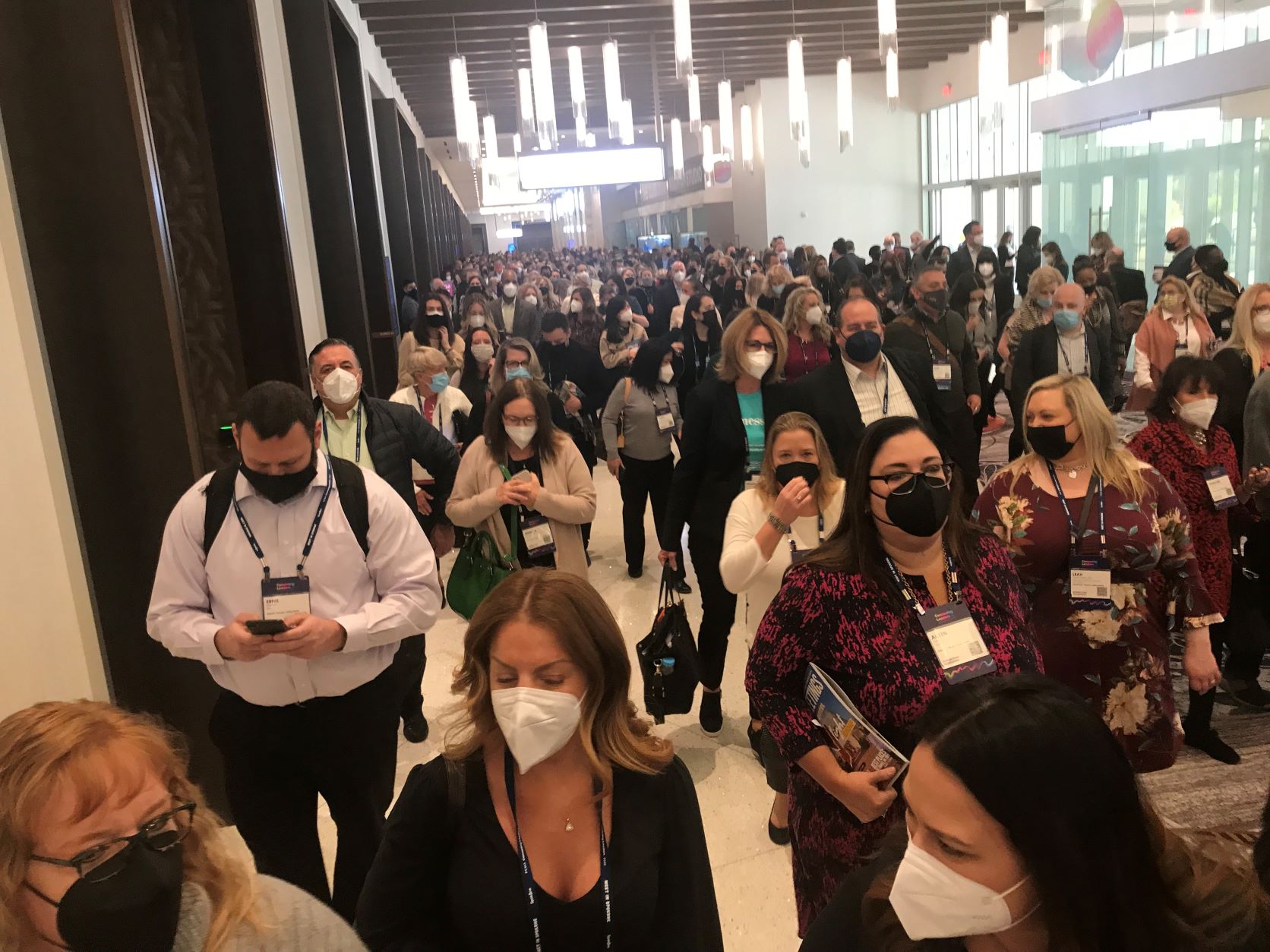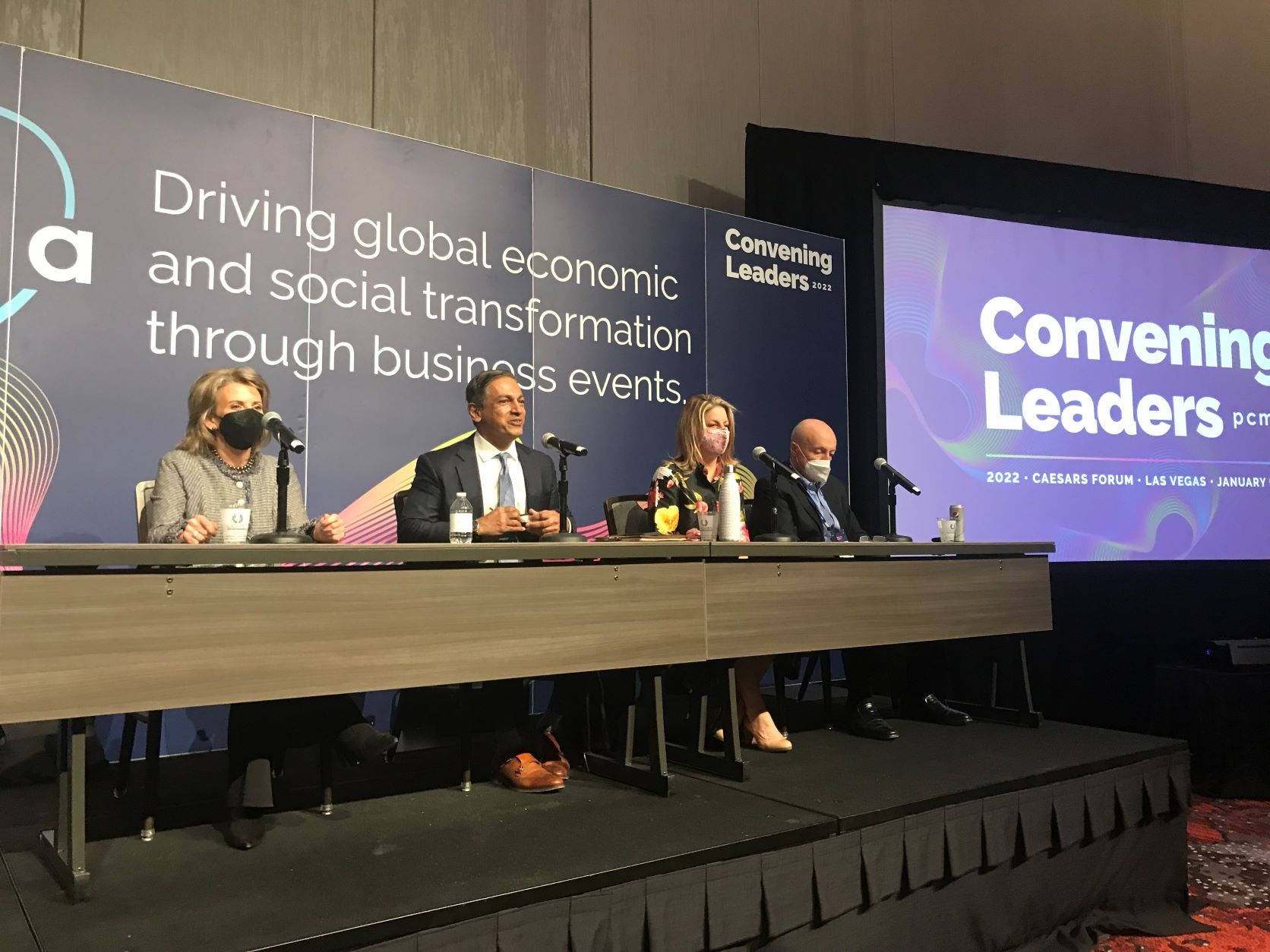Update: On January 25, PCMA issued a final health and safety update indicating a total of 96 positive COVID-19 cases had been reported to the association, adding that all indicated mild symptoms. Considering the total in-person attendance was reported at approximately 2,300, the number of positive cases represents 4% of the total in-person participation.
After taking a firm stand when many of its meetings and events industry sister associations decided to postpone major in-person events due to the omicron variant, PCMA has posted respectable attendance numbers at its Convening Leaders conference, held January 9-12 at CAESARS FORUM in Las Vegas.
“Right here in Las Vegas we have, in-person, 2,500 people in attendance and have 600 online now,” said Sherrif Karamat, CEO of PCMA, “and I’m thrilled.”
As a comparison, the 2019 Convening Leaders, held in Pittsburgh, attracted 3,895 attendees, while the 2020 Convening Leaders in San Francisco drew 5,300.
PCMA required all attendees to provide proof of vaccination before attending in-person, which was handled by Safe Expo through an online portal. PCMA also strongly suggested attendees have a COVID-19 booster shot and required the wearing of masks at all indoor events. The association also reconfigured its food and beverage functions to better facilitate social distancing and other health protocols.
“We want people to use common sense, which is the bottom line,” Karamat said.
“We're meeting this week here in Las Vegas and CAESARS FORUM because we can do so safely,” he added. “We are able to create a blueprint that other organizations can follow.”
Karamat said that Safe Expo, a company that offers full-service pre-to-post health safety monitoring for events, will handle all of the post-event tracking of any infections that may have occurred during the time period of the conference.
Other relevant PCMA Convening Leaders attendance numbers included the following:
- 47% of attendees have 20 or more years of industry experience
- 10% of attendees are CEOs
- 10% of attendees represent c- level positions in their organizations
- 10% of attendees are in upper-level management positions in their organizations
- 29% of attendees are at the director level in their organizations

When asked whether the current omicron variant surge is impacting in-person event cancellations, Karamat and other PCMA leaders speaking at the Convening Leaders press conference said the effects so far seem relatively minimal.
“What we’re seeing is that certainly, it's not just omicron—although omicron is in its peak stage,” Karamat said, “but there are cancellations happening. There's also travel restrictions that are impacting that. I will say that in the corporate space it's more severe than the association space.”
Fellow PCMA leaders who represent destinations echoed Karamat’s observations regarding the immediate impact of the omicron variant.
“Moving into ‘22, there are no cancellations as of yet,” said PCMA Foundation Board Chair Angie Ranalli, vice president of sales-Midwest region San Diego Tourism Authority. “However, we have a January booking [that has] the possibility of moving into the second quarter. And among all of the ’22 bookings there currently is no intent of cancellation, which I find, frankly, rather remarkable, but it has to be constantly revisited on a monthly basis.”
Nashville is also bullish on the current environment, despite the omicron variant’s incredibly transmissible nature.
“We got a couple smaller cancellations, some stuff that is local or regional, or some corporate things, but really they're all still coming,” said incoming PCMA Board Chair Charles Starks, president and CEO of Nashville’s Music City Center. “We’ve got a group of 9,000 a week after next, and I read an email this morning, saying now there was 9,400, and so we're seeing some encouragement that way. I really haven’t seen cancellations yet, fortunately."
Representing the association side, PCMA Board Chair Kirsten Olean, director of meetings for the Cystic Fibrosis Foundation, said the current environment allows organizations to exercise a greater degree of choice, both as an organization and as individuals, when it comes to deciding whether to hold a meeting in the first part of 2022.
“The big difference between where we started in the pandemic and where we are now is that in March of 2020, everyone cancelled their meetings,” said Olean. “I don't think you can make a general statement about who's canceling, who's not canceling, who's choosing to hold their meetings, what their attendance looks like, because it's so industry specific and is also organization specific.
“So, it’s just in a different place than we were when we started,” she continued. “We just didn’t have a choice at the beginning, and now it is a choice that every organization needs to make for themselves.”
Filling the Leadership Pipeline
Aside from a COVID-19 pandemic that is sucking all of the oxygen out of the room in terms of industry issues and priorities, many meetings and events leaders and organizations are bemoaning a perceived lack of future leadership in associations as well as the hospitality and meetings industries in general.
“I do think that this is something that associations struggle with across the board,” Olean said. “I think PCMA is a little bit unique in that because it's really hard to be very successful in this industry if you're not engaged with an industry organization.
“This particular industry is all about connections. It's all about relationships. It's all about who you know,” she continued. “If you're not attending events and belong to an organization, and having the opportunity to build your network, you're just not going to be as successful in your careers. I think we're in a unique position in that case, and we do attract a lot of young people to the organization because they're passionate about the industry and they recognize that those connections are critical for them to continue to grow in their careers.”
Ranelli said that San Diego Tourism Authority, representing the DMO world, is making a concerted effort to foster the next generation of destination marketing professionals.
“We're frankly very intentional about what our future workforce looks like,” she said, “and this requires focus on the entry-level employee and where they're coming from. There's a tremendous amount of outreach at college and university levels; there are scholarships available that we promote and even specific scholarships to attend this meeting, because it is our annual event that provides the most exposure to this generation. And it's been rather successful—and that's probably why you see a changing demographic at this meeting. I'm looking forward, frankly, to more success with this in the future because we need it, and the industry needs it.”
Karamat said the pandemic has challenged the leadership and employment not just in the hospitality industry, but in the workforce in general.
“We do have retirement, and I think that is less about our industry but every industry,” Karamat said. “I think one of the challenges of all industries is a leadership vacuum—our current leaders creating future leaders. However, I also believe that we are not the only industry that is prone to the exit of talent, and equally, we have gotten talent that wants to come into our industry. Unfortunately, when the pandemic first started, especially on the supply side…there were layoffs happening, and some of those people did exit their industry tracks.”







